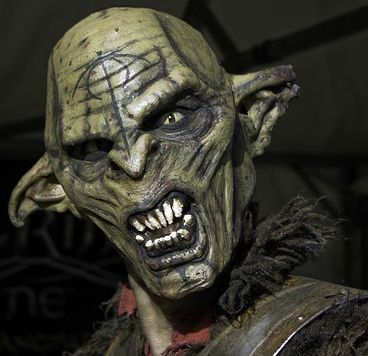The Problem with Orcs
I have mixed feelings about orcs.
I love fantasy. I love to read it and I love to write it. But when I’m reading a fantasy novel and I come across orcs – or an obvious analog – I sigh. I’ve hit something that doesn’t feel like an actual creature anymore, just a placeholder for one of two story functions:
- Cannon fodder. The orcs aren’t the real threat. They’re the henchmen of the real threat or maybe the real threat’s army. They may pose some opposition, but you know they aren’t significant. Odds are the good guys will kill them in bulk, like they’re shopping at Costco. “I’ll take the hundred-pack of toilet paper, the eight gallon jug of saline solution and the pallet of orc bodies (with real battlefield littering action!).” Seriously, in this case orcs might as well be stormtroopers.
- Background. In this case, there will be an orc character who is the exception (and the character may only be half-orc, for further distancing). We know how big and bad he is because the rest of “his people” give us context (race/culture issues anyone?), but this character is different. Yes, I just called Drizzt Do’Urden an orc (same tool, different box).
What’s more, the moment I see orcs I wonder which type they’ll be (and really, are there more than two options here?):
- Savage brutes. Tolkien started this, but many have continued the tradition to the extent that we can even find this sort in space.
- Noble, honorable warriors. I forget who started this one in fiction (by the time it came around I was avoiding any book that looked like it had orcs), but I’ve seen it enough in games that it doesn’t surprise me anywhere (Klingons, I’m looking at you).
But in tabletop RPGs (like Dungeons and Dragons or GURPS or even Orkworld) and videogames (like World of Warcraft) I don’t mind any of those things. As opposition, their threat is real enough – I know my character could die. Oh, sure, if the game master varied from the pattern I’d enjoy the change, but I don’t lose sleep over fighting the same orcs I’ve faced since 1976.
As a game master, I like to mess with the expectations. For example, in my last campaign, I included three orc analogs.
- First there were goblins. They started as traditional D&D goblins: small and weak. They were bullied into fighting the player characters, but the paladin’s player bullied them into helping instead (with impressive religious intimidation). Then came the variation: three of the goblins converted and returned to follow the paladin. Two died soon after (not the players’ fault. The goblins weren’t tough enough to run with that crowd), but the third stuck around and became a respected member of the party.
- Next there were hobgoblins, an organized threat but willing participants in diplomacy. They were difficult to deal with, but they honored their treaties and were honestly interested in trade. I’d like to think that I established their culture and behavior well enough that they did not fall into one of the stereotype groups up above.
- Finally came the orcs. Not a pack or a crowd, but a horde big enough to wipe out everyone and everything the players knew. The orcs descended like the Ducky Boys from The Wanderers*, and the players only drove them off by uniting the various factions they’d met (including the hobgoblins). These orcs didn’t serve the threat, they were the threat. And while I had cooked up a culture for them, it wasn’t one that wanted diplomacy with groups it saw as weaker.
In retrospect, I’m pleased with the way the game worked out. I took the orcs from cannon fodder to major campaign threat.
I’d love to see something like that done in fiction, to see some writer redeem orcs by making them something different and unexpected, even if it’s done under a different name. For example, the humans could be the barbarians (something like the Celts perhaps) and the orcs the civilizing invaders (like Rome). Would that work, or would we no longer recognize them as orcs? Maybe I’ll play with it someday myself.
I do have a copy of Orcs by Stan Nicholls, but I have yet to read it (I got it while going through an MFA program. Give me a break!). I’d love to hear your thoughts about that book, or orcs in general, in the comments below.
*Though I consider the Ducky Boys to represent the fae in that movie. I’ll post about that another time.


